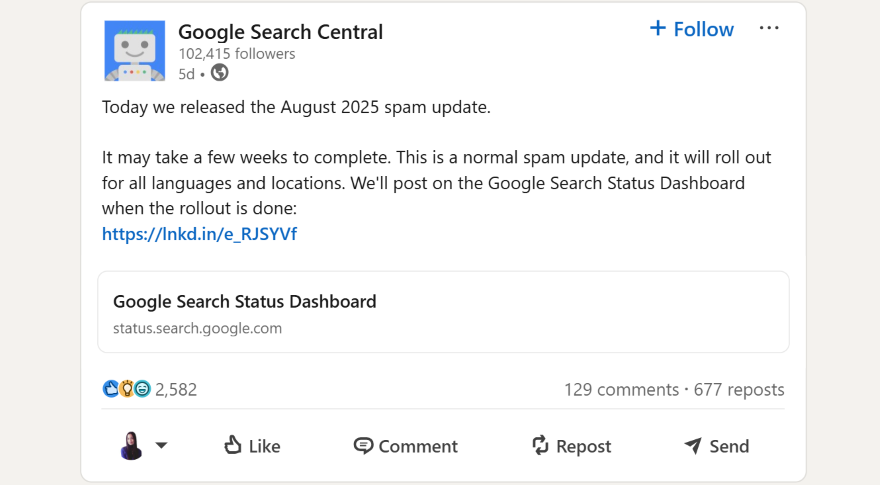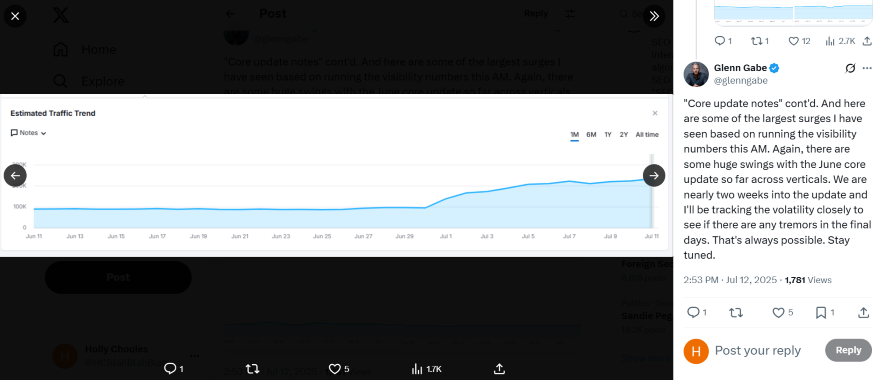All The Google Algorithm Updates Since 2022: Core Updates & More
We may receive a commission from our partners if you click on a link and purchase a product or service on their website. Learn more

With users making billions of searches per day, Google has to keep up with search behaviors by tweaking its algorithm regularly – much to the dismay of SEO professionals, publishers, and small website owners everywhere. These algorithm updates often lead to fluctuations in the search results that, in turn, mess with page rankings.
But how much have Google search algorithms changed in the past few years? Below, I’ve compiled a list of significant algorithm updates since 2022 (the same year that the game changing December Helpful Content update took place). I will continually add to this list as new changes roll out, whether that’s a core update, review update, or spam update.
2025 Google Algorithm Update History
August 26 2025, Google Spam Update
On the last Tuesday of August, Google announced the beginning of a spam update — the first one of 2025. The update took three weeks and five days to complete and focused on targeting websites that had violated Google’s spam policies. During this time period, the SERPs experienced high volatility and website owners were encouraged to check their existing content for spammy practices that could penalize their webpages.

June 30 2025, Google June Core Update
During the start of summer, Google appeared with its second core update of the year. This update focused on Google’s SERPs and the never-ending quest to make sure that only high-quality, helpful content makes the cut.
It officially ended on July 17, lasting just over two weeks.
Though ranking drops are now expected with core updates, SEO professionals also noticed some ranking surges, too. Take Glenn Gabe’s findings, for instance:

March 13 2025, Google March Core Update
In March, Google rolled out its first core update of 2025, which took two weeks to complete. Google made this statement from its official LinkedIn page:
“This is a regular update designed to better surface relevant, satisfying content for searchers from all types of sites. We also continue our work to surface more content from creators through a series of improvements throughout this year. Some have already happened; additional ones will come later.”
- More info: March core update ends on time
2024 Google Algorithm Update History
December 19 2024, Google Spam Update
Only one day after the end of the December core update, Google has rolled out a spam update that targets sites violating its search spam policies. According to the official status dashboard, “the rollout may take up to 1 week to compete.”
December 12 2024, Surprise Google December Core Update
- Only a week after Google’s November core update, the company surprised the SEO community with yet another update. Overall, it took six days to complete, ending on December 18 2024.
- As per usual, this update caused significant search volatility, which is demonstrated in the graph below:

September 11 2024, Google November Core Update
- After being hinted at the Google Web Creator Summit – where numerous small businesses had expressed issues with their current page rankings on search – Google rolled out its November core update, which ended on December 5 2024.
- For this update, Google added updated its official documentation and mentioned that business owners should:
- Avoid making quick fix changes to web pages for SEO. Instead, only make changes that are useful for readers and add meaning to any content.
- Only delete content as a last resort if it’s deemed truly unhelpful for a site’s visitors and doesn’t fulfill their needs
August 15 2024, Google August Core Update
- After a great deal of anticipation, Google released its core update for August. However, much to the surprise of SEO professionals, this significant update took only 19 days to roll out, which was much shorter than expected.
- After its completion, the SERPs continued to fluctuate, as shown by Glenn Gabe’s tracking efforts below:

- On this update, Google Search Advocate John Mueller stated:
“This latest update takes into account the feedback we’ve heard from some creators and others over the past few months. As always, we aim to connect people with a range of high quality sites, including small or independent sites that are creating useful, original content, when relevant to users’ searches.”
In response to this ranking issue, Google confirmed that it was unrelated to the August Core Update. The company eventually resolved the problem on August 20 2024 (only five days later).
July 31 2024, Google Addresses Deepfakes
- To protect users against sexually explicit deepfakes – digitally altered videos that can make a person appear as someone else – Google has announced in a blog update that it’s cracking down on this harmful form of content. Google states:
“ As generative imagery technology has continued to improve in recent years, there has been a concerning increase in generated images and videos that portray people in sexually explicit contexts, distributed on the web without their consent.”
- Resulting from this update, Google has made it easier for a user to request the removal of non-consensual deepfakes and have the content filtered out from results. It’s also improved its ranking systems to reduce the chances of them showing up on search.
June 20 2024, June Spam Update
- Taking a week to complete, Google’s June spam update caused further disruption in the SERPs, particularly for smaller website owners. It targeted websites violating Google search spam policies, but didn’t include link spam or the site reputation abuse policy.
May 27 2024, Google Algorithm Leak
- Sending shockwaves through the SEO community, a whistleblower leaked 2,500 documents from Google’s Search Content Warehouse API. Website owners gained valuable information on how Google ranks content, including how website navigation, domain age, and link diversity can all impact a page’s position on search.
- On her X account, Aleyda Solis summarized a few of these findings:

May 14 2024, Launch of AI Overviews
- Google officially launched AI-generated overviews in US search results, a substantial change that garnered significant media attention. From that point on, a user could receive an AI-generated summary response after typing a specific query into the Google search bar.
- This update, however, did receive some backlash, especially after users began spotting errors in some of the information generated.
March 5 2024, Google March Core Update
- Coinciding with a spam update and taking 45 days to complete, March’s core update was one of Google’s most significant updates yet. It transformed multiple core systems and marked a new approach to identifying content that is considered helpful to users.
March 5 2024, March Spam Update
- In its bid to remove spammy and unhelpful content from search results – a process ongoing since 2022 – Google unveiled yet another spam update in March 2024 that took 14 days and 21 hours to complete. The process reduced unoriginal, spammy content by 45%, surpassing Google’s initial target of 40%.
2023 Google Algorithm Update History
November 8 2023, Reviews Update
- The final reviews update of 2023 spanned 29 days and coincided with the core update on November 2. Following these changes, Google tweaked its reviews system documentation and confirmed that “the reviews system is improved at a regular and ongoing pace.” This update officially finished on December 2 but, as per usual, came with plenty of SERPs volatility throughout its run.

November 2 2023, Google Core Update
- The fourth and final core update of 2023 took 25 days to rollout. As per usual, this significant update caused major SERP volatility, leaving many small website owners with fluctuating page rankings.
October 5 2023, Google Core Update
- Only one day after announcing its spam update, Google added more fuel to the fire by rolling out its core update for October too. The update took almost 14 days to complete and led to further turbulence in SERPs.
October 4 2023, Google Spam Update
- When the Google Help community reported spam pages in multiple languages – Hindi, Chinese, and Vietnamese just to name a few – Google initiated a new spam update. Its aim? To clean up auto-generated, hacked, cloaked, or scraped scam pages from search. The update took 15 days and 12 hours to complete.
September 14 2023, Helpful Content Update
- This September update, which took 13 days and 11 hours to complete, saw Google release more valuable details on its helpful content guidelines. Website owners should only update content dates when a page has been significantly changed, add or remove content wisely, and make sure that authoritative pieces are backed by experts.

August 22 2023, Google Core Update
- The second core update of 2023 was followed by a wave of volatility in SERPs. It took 16 days and three hours to complete.
April 12 2023, Reviews Update
- This update encompassed review website content relating to services and businesses, media (like games or movies), and destinations. Google also released new documentation on how to write reviews that revealed best practices when creating high-quality review pages. The update reached completion in 13 days and two hours.
March 15 2023, Google Core Update
- A catalyst for further SERP volatility, Google rolled out a March core update in 13 days and seven hours.
February 21 2023, Product Reviews Update
- Starting 2023 with a bang, Google’s product reviews update lasted 14 days and impacted websites in multiple languages: English, French, German, Spanish, Italian, Russian, Polish, Dutch, Portuguese, Vietnamese, and Indonesian. The update focused on rewarding high-quality product reviews in search results.
2022 Google Algorithm Update History
December 14 2022, Link Spam Update
- Google used its AI spam-prevention system, SpamBrain, to crack down on spammy, inorganic links used to manipulate search rankings. The update impacted pages in all languages and took 29 days to complete.
December 5 2022, Helpful Content Update
- The December helpful content update took a whopping 38 days to roll out – much longer than initially expected. Not only did the update impact all languages, but it updated the system with extra signals used to identify and rank high-quality content. Additionally, it led to major fluctuations in SERPs, with many businesses seeing a decline in page visibility and traffic.

October 19 2022, Spam Update
- Taking only two days to complete, Google launched another spam update aiming to reduce the amount of spammy pages found in SERPs.
September 20 2022, Product Reviews Update
- This Google update targeted English language product reviews in particular, aiming to reward high-quality review pages in the SERPs. The update took six days to complete, and only review websites were impacted by this change (both positively and negatively depending on the quality of their content).
September 12 2022, Google Core Update
- Google launched another core update in September that took two weeks to complete. Though it did cause further SERP volatility, the general consensus is that it was less impactful in comparison to other updates, like the May 25 core update earlier in the year.
August 25 2022, Helpful Content Update
- In August 2022, Google launched its first helpful content update. Brand new documentation outlined the company’s focus on “more original helpful content, written by people, for people, in search results.” Taking 15 days to complete, it signified a new age of people-first content over content that is created with the sole purpose of ranking well in search results.
July 27 2022, Product Reviews Update
- The July product reviews update targeted low-quality review pages and took six days to complete.
May 25 2022, Google Core Update
- The first core update of 2022 was a volatile one and caused a wave of fluctuations in the SERPs. The rollout took 15 days to complete.
March 23 2022, Product Reviews Update
- On this date, Google posted in the Search Central Blog to announce its next product reviews update, which took 14 days to roll out. The documentation confirmed that “review updates apply to all forms of review content,” be it comparison reviews or ranked lists.
February 22 2022, Page Experience Update for Desktop
- Taking nine days to complete, this update assessed page ranking signals for desktop devices, such as HTTPS security and website load times.
How Often Does the Google Search Algorithm Change?
Though Google makes small algorithm updates daily, there are a number of significant updates that happen each year. For instance, Google Search’s core updates happen several times a year and signify broad changes to the algorithm. This above list features the most significant updates of each year.
How Does the Google Search Algorithm Work?
It’s difficult to get a full picture of how the Google Search Algorithm works. As the list has shown us, it changes frequently and follows a complex set of rules. Also, Google isn’t 100% transparent about how it chooses which pages rank in search results. However, here’s what we do know:
- Google uses crawlers to find new content – New and updated content is published every day. To make sure this content is indexed in its search results, Google uses crawlers to discover these page URLs and categorize them based on the content inside.
- Google looks at five key factors to find relevant results – The five key factors are: Meaning, Relevance, Quality, Usability, and Context. You can read more about each factor in Google Search’s documentation.
- Additionally, Google examines around 200 other ranking factors when ranking content – This covers plenty of ground, from mobile optimized pages and internal linking to keywords and backlinks.
🤔 Want to know more? See our in-depth guide to what is the Google algorithm
How Can I Prepare for a Google Algorithm Update?
It’s easy to feel overwhelmed by Google algorithm updates, especially when it’s tricky to pinpoint the exact day another one will strike. However, not all hope is lost, since there are numerous ways you can prepare for future updates and protect your website’s rankings as much as you can.
Here are my top four tips:
- Quality is key – No matter what Google throws at you, quality should always be at the heart of your website’s content. Remember to fulfill your user’s needs, update pages for freshness when necessary, have backlinks on authoritative websites, and steer clear of AI to show Google that your pages feature original content.
- Don’t forget the technicalities – You’ll also need to keep on top of your technical SEO. This includes maintaining fast load times, a secure HTTPS, and a mobile-friendly interface – all factors that Google takes into consideration when ranking pages.
- Audit your content regularly – It’s important to keep a regular eye on your website’s performance. This includes checking visibility (you can use platforms like Sistrix or Semrush to do so), and examining other metrics that are important to your business, be it conversions, clicks, or engagement. Use these audits to identify problem areas and create an action plan.
- Stay informed – Read SEO newsletters or other news sources regularly to keep on top of best practices, signs of search volatility, and any potential updates on the way.
It’s important to remember that Google’s most significant updates typically happen about ten times a year. Because of this, you need to keep on top of your website’s SEO all year round. Though constant website audits and updates can be time consuming, it’s the best way to keep up with Google’s changes and ensure that your content remains as helpful as possible for users.





Leave a comment